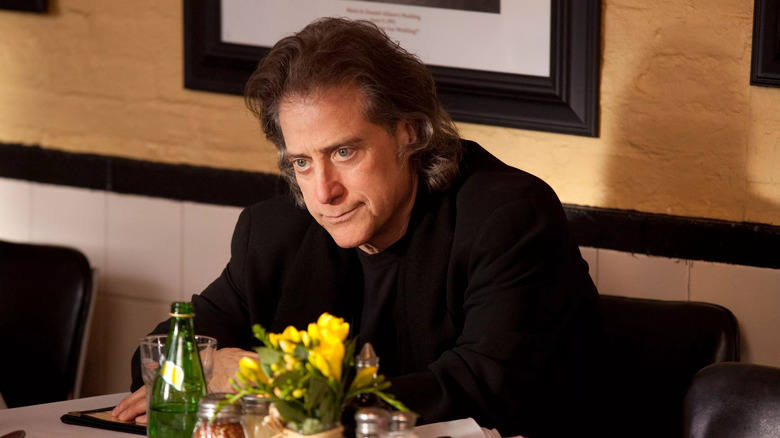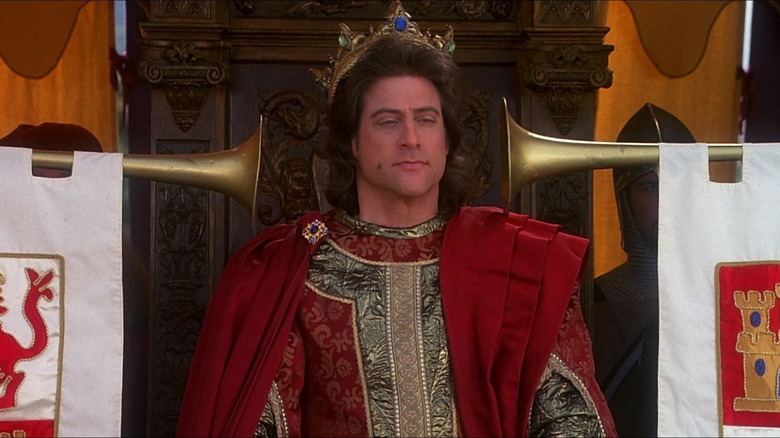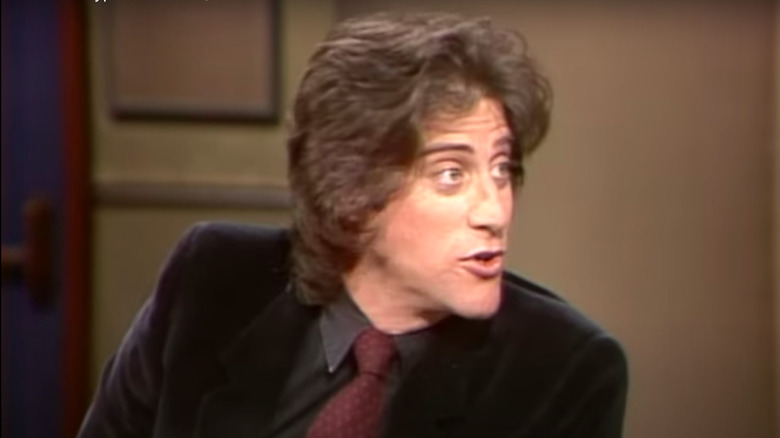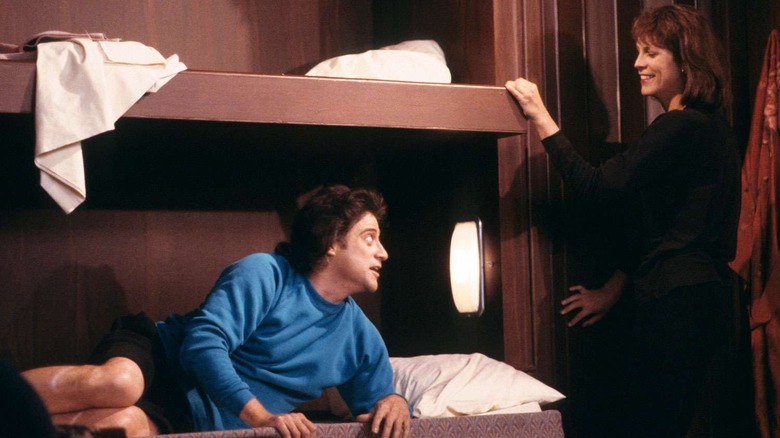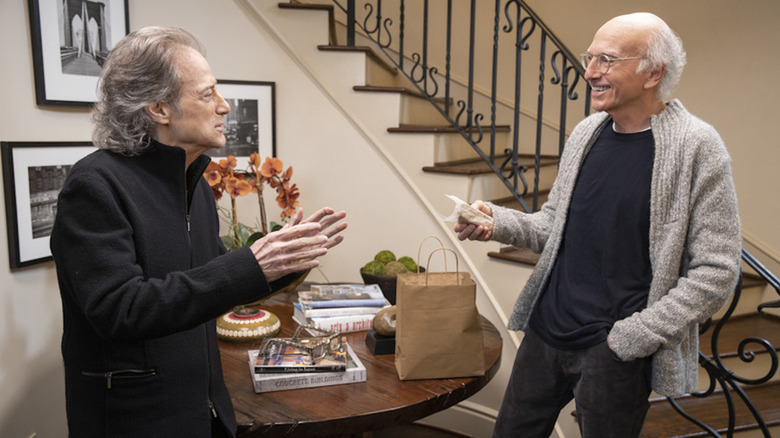Richard Lewis, Comedian And Curb Your Enthusiasm Star, Has Died At 76
Richard Lewis, one of the most influential stand-up comedians of his era and Larry David's hilariously neurotic best friend on HBO's "Curb Your Enthusiasm," has died at the age of 76. The official cause of death was listed as a heart attack.
Lewis belonged to a class of comedians who turned joke-telling into a confessional art form. His contemporaries were Richard Belzer, Elayne Boosler, Robert Klein, and Jerry Seinfeld. Lewis got belly laughs out of failed relationships, depression, anxiety, and addiction. He was reliably, identifiably miserable, which was a balm for anyone in his audience who happened to be struggling because, no matter how awful his life seemed to be, he was always back on stage the next night or bantering with David Letterman a week month later after recounting his latest crisis.
He was a neurotic's neurotic, and, therefore, an essential part of our lives. If he could laugh off life's absurd tortures, so could we.
Despite his dark demeanor, Lewis was handsome and charming enough to make a run at stardom. He was terrific for four seasons opposite Jamie Lee Curtis on the ABC sitcom "Anything But Love," and was a familiar face in movies during the 1990s thanks to turns in "Once Upon a Crime," "Robin Hood: Men in Tights" and "Leaving Las Vegas."
For many, he'll be best remembered as a not-too-fictionalized version of himself on "Curb Your Enthusiasm," which mined his long friendship with David for close-to-the-bone laughs. It's impossible to imagine the show becoming a runaway success without their frequent bickering, and, frankly, it's impossible to imagine a world where Lewis won't be around to cushion the blow of life's myriad cruelties.
A distinct type of funny man
Born on June 29, 1947 in Brooklyn, New York, Lewis displayed a penchant for comedy early on as a class clown. He met his future friend and collaborator Larry David at a Cornwall-on-Hudson, New York summer camp, and claimed that they initially hated each other. Happily, they achieved a detente when they began running into each other on the New York City stand-up circuit a decade later.
After graduating from high school in Englewood, New Jersey, Lewis earned a Bachelor's degree in marketing from The Ohio State University, which allowed him to cash paychecks at a Manhattan ad agency in the early 1970s while he wrote and submitted jokes to established comedians. He'd already embarked on a stand-up career when he caught the eye of David Brenner, a giant in the comedy world who'd become one of Johnny Carson's favorite guests on "The Tonight Show." For aspiring comedians, there was not a more important gig than a five-minute slot on the last segment of "The Tonight Show." Just booking it meant years' worth of bragging rights ("You've seen our next comic on..."); if you made Johnny laugh, Hollywood beckoned.
Lewis' first "Tonight Show" appearance was classic Lewis. He killed, but got so drunk on the audience's uproarious laughter that he didn't realize he'd blown through his allotted time for a grand, grimace-inducing total of 11 minutes. It didn't matter if the crowd loved him; no first-time, wet-behind-the-ears stand-up grandstanded on Carson's stage and got away with it. In the very sweet appreciation he wrote for Entertainment Weekly after Carson passed, Lewis revealed that he begged the kingmaker's forgiveness in person at a trendy L.A. eatery. He was convinced his life in comedy was over, but Carson spared the youngster. Lewis got invited back, but he didn't attain full-on stand-up stardom until the early 1980s, when NBC experimented with a hip 12:30 a.m. complement to "The Tonight Show."
Lewis and Letterman
Richard Lewis on "Late Night with David Letterman" was an event. Even though I was too young to appreciate his tales of dating woe and sexual misadventures, his neurotic delivery, and seeming honesty (the more we got to know Lewis via his interviews and writing, the more we'd learn there was nothing "seeming" about it) set him apart from the light absurdism of Robert Klein and perplexed fury of George Carlin (as explored in Judd Apatow's "George Carlin's American Dream"). Lewis was a relatable Woody Allen. His appearances on Letterman were mini confessionals, and unlike Carson's perpetually disengaged successor Jay Leno, Letterman knew how to volley with Lewis. Most comics just do a conversational version of their act during these guest segments, but Letterman was tickled by the nimbleness of Lewis' tortured mind.
It was during one of these visits that I first heard Lewis drop his patented "[so-and-so] from hell" line. I think it had already become a popular idiom by this point because it got the kind of applause-laugh Rodney Dangerfield received when, after rattling off a series of indignities, he'd hit his signature "I get no respect" catchphrase. But it never hit me that he coined this phrase until I started kicking around NYC comedy clubs in the late '90s. Every comic who knew their stand-up history knew good and goddamn well this was Lewis' calling card.
And every comic, no matter what style of stand-up they preferred — absurdist, political, observational — revered Lewis. This was surprising to me because he'd hit a rough patch professionally around this point. His bid for leading man stardom in film and television had failed, and he was back to being good ol' neurotic Lewis on comedy club stages and talk-show couches. I'd taken him for granted. I'd forgotten how influential he was, and didn't appreciate how great he could still be.
His amazing second act was just around the corner.
Sitcoms, movies and the brink of oblivion
Getting there wasn't easy. After cementing his rep as one of the best working stand-ups in the 1980s with a series of cable specials, television producer Wendy Klout paired Lewis with Jamie Lee Curtis for the ABC series "Anything But Love." It was an amiable variation on the workplace sitcom (in this case a Chicago magazine), but Lewis and Curtis played gamely to their strengths and generated sufficient chemistry to keep the show running despite increasingly poor ratings.
At the time, it felt like ABC was taking a gamble on Lewis, whose entire showbiz identity was built around his stand-up act. Could he make this act work while playing a character within the framework of a sitcom? The series premiered on March 7, 1989, and initially proved popular. It was certainly far more sure of itself than the comedian-led NBC sitcom that debuted four months later. At least Lewis had sex appeal. There was nothing sexy about Jerry Seinfeld.
Lewis was a great actor, but Hollywood only wanted him for yuks. Following the 1992 cancellation of "Anything But Love," he appeared in a series of direly unfunny big-screen comedies including "Once Upon a Crime," "Robin Hood: Men in Tights" (though his Prince John is a standout in one of Mel Brooks' weakest efforts) and "Wagons East" (the film John Candy died making).
Candy's death shook up Lewis, who'd been battling drug and alcohol addiction for years. He immediately got sober and starred in Peter Cohn's substance abuse drama "Drunks," which should've been a springboard to more film roles. Though the movie earned decent reviews, it failed to find an audience. Fortunately, Lewis could always make a living as a stand-up, but he wasn't just a stand-up. He had more to offer. That's when his former summer camp nemesis came to his rescue.
Reigniting the public's enthusiasm for Larry David
Actually, Lewis rescued Larry David in a way. The "Seinfeld" co-creator's follow-up to one of the most celebrated sitcoms of all time was a little-seen, viciously panned film called "Sour Grapes." I thought it was hilarious, but I was also the only person laughing in the sparsely attended opening day screening I attended. The early returns suggested David was just a (now) wealthy misanthrope without Seinfeld.
When David realized that's how people viewed him, he slammed the brakes on writing mean-spirited movies and sitcoms with fictional characters, and decided to investigate his curmudgeonliness via a semi-fictionalized version of his own life. And he couldn't pull this funhouse mirror act off without his best showbiz friend.
25 years after its proof-of-concept pilot (which doubled as a stand-up special), "Curb Your Enthusiasm" remains an essential send-up of Hollywood myopia and self-loathing, and I'm not sure I would've bought in without Lewis' early appearances. Fictionalized Larry is awful. He's candidly awful and would, at times, like to not be awful, but you need a foil who knows him well enough to put up with this pathetic internal dynamic.
Lewis did this by offsetting Larry's crankiness with a dialed-up-to-11 version of his very real neuroses. But he had a conscience, which made him Larry's relentlessly despondent Jiminy Cricket. And thus the "Curb Your Enthusiasm" template was set. You tuned in every week to watch these cringingly self-aware narcissists needlessly complicate their lives in monstrously inventive ways.
The Richard Lewis of "Curb Your Enthusiasm" was the first season's saving grace. The Richard Lewis of stand-up was, for me, especially as I grew older, a savior. His comedy kept asking questions to which we'll never get answers. Why is the universe out to get us? Why do we keep failing? Why do we keep enabling our failure? And why do we keep going despite this?
Because, as Samuel Beckett taught us in "Waiting for Godot," hanging around is kind of funny. It's just going to be less funny without Richard Lewis. Nevertheless, let's go.
